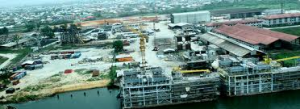Oil
Nigeria set to become Africa’s Oil and Gas industry hub
By Yemie ADEOYE
…drives indigenous participation to 18% in 4 years
HOUSTON TX-FOUR years after the enactment of the Nigerian Oil and Gas Industry Act, the Nigerian Content Development and Monitoring Board (NCDMB) in its quest to position the country as Africa’s Oil and Gas industry hub has driven indigenous growth by 18 percent even has it has also saved the country well over 12.7 billion dollars annually in capital flight.
As the federal Government Agency saddled with the responsibility of implementing the NOGIC Act, the NCDMB has developed concepts that has driven indigenous participation in the oil and gas industry from five to 18 percent in a spate of 4 years, an effort which has positioned Nigeria as the emerging oil and gas industry hub.
Currently East Africa is intensely working to become a central Oil and Gas hub for Africa by the 2020 kudos to the efforts of Kenya, Mozambique and Tanzania. But with efforts of the NCDMB that dream might as well remain a dream.
Since its inception, the NOGICD Act, it has enhanced job creation and the development of indigenous human and technical expertise. This has further stimulated other sectors of the economy and ultimately, it will continue to positively impact Nigeria’s Gross Domestic Product.
Speaking at the recently held Practical Nigerian Conference Content seminar held in Yenagoa, capital of Bayelsa state, south-south Nigeria, the Minister of Petroleum Resources, Mrs Diezani Alison Madueke took time out to enumerate the success of the NOGIC Act as been driven and implemented by the NCDMB even as she also noted that there are some of the challenges that local companies are faced with e.g. technical knowhow, finance etc. “The good news however, is that Government – through the NCDMB – are putting processes and initiatives in place to combat these challenges. Some of these initiatives include partial guarantee of loans through NCDF and various capacity development initiatives.”
Mrs. Madueke further stated that these targets were driven by the desire of government to maximize the utilization of Nigerian goods and services across the oil & gas industry value chain within the shortest time possible. “The targets were set to ensure functional linkage of the oil and gas sector to other sectors of the national economy, domiciliation of critical industry assets and creation of credible local supply base of oil & gas equipment and services in Nigeria.”
“I am delighted to say that the implementation of the targets over the last four years are beginning to yield visible dividends and it is important to share some of the success stories with you.”
“In the area of Indigenous ownership of assets Nigerian ownership of strategic assets like marine vessels and oil rig assets are cardinal to local content development. Measures have been put in place to encourage local investments on such critical assets. There is also a certification regime in place to audit equipment ownership claims and ensure that no foreign equipment or asset is put to work until existing Nigerian capacities have been exhausted” she said.
The Minister who was ably represented at the event by the Permanent Secretary, Ministry of Petroleum Resources Dr. Jamila Shu’ara told the gathering of top players in the oil and gas industry that since the implementation of the marine vessel utilization strategy in 2013, there has been a marked growth in the number of Nigerian owned vessels that are doing business in the oil & gas industry. She explained that out of 1,000 marine vessels that were captured by the Board in 2013, 49.5 percent were in category A, meaning they were either built in Nigeria or owned by Nigerians. Also, out of 1,232 vessels captured as at 3rd Quarter of 2014, 89.2 percent were in category A (and class AAA).
Speaking in the area of Infrastructure Development & Facility Upgrade, the minister said that NigerDock now has the largest dry-dock facility in West Africa for maintenance and service of medium-sized vessels, a direct result of the local content policy, even as she noted that a minimum of two additional dry-docking facilities will be required within the shortest possible time for vessel maintenance and ship repairs in view of the growing economic and maritime activities in Nigeria and West Africa. “Such dry-docking facilities would also put the nation on a right path towards building ocean going vessels. Government is keen on encouraging investments in this area. A new dry dock facility would attract about $1billion dollars into the Nigerian economy and generate over 9,000 direct and ancillary employment opportunities for Nigerians.”
The NCDMB by virtue of its clear cut implementation of the NOGIC Act and creative thinking aimed at making a success story of Nigerian Content has also brought about Upgrades of Fabrication Yards.
Oil
NNPC Targets 60% Methane Emission Reduction By 2031
The Nigerian National Petroleum Company Limited (NNPC) has unveiled a bold strategy to reduce methane emissions in the oil and gas sector by 60% by 2031, with an ultimate goal of achieving net-zero emissions by 2060.
This announcement reinforces Nigeria’s leadership role under the Global Methane Pledge initiative and its commitment to tackling climate change.
The Group Chief Executive Officer of NNPC, Mele Kyari, disclosed these plans during a meeting on Thursday with Robert Leahman, the U.S. State Department’s Global Methane Program Manager, and a delegation from Deloitte.
READ MORE: Atiku Gloats Over AUN’s Achievements Ahead Of 20th Anniversary
The discussions, held at the NNPC Towers in Abuja, focused on collaborative efforts to reduce methane emissions through innovative and sustainable practices.
“Reducing methane emissions is not just an environmental necessity but also a strategic imperative for Nigeria’s energy transition. We are leveraging partnerships to adopt global best practices and innovative solutions,” Kyari stated.
Key among these efforts is a pilot project in the Niger Delta, aimed at establishing emissions baselines, mitigating methane leaks, and promoting sustainable operations across Nigeria’s energy sector.
The project, a partnership between NNPC, Deloitte, and the U.S. Bureau of Energy Resources, will utilize data-driven methodologies to pinpoint and address methane hotspots.
Robert Leahman commended Nigeria’s proactive stance, describing it as a benchmark for other nations on the continent.
“Nigeria’s leadership under the Global Methane Pledge sets a standard for the continent. These initiatives will not only help reduce emissions but also drive sustainable development in the energy sector,” he said.
Kyari highlighted the broader benefits of addressing methane emissions, noting its significance for both environmental protection and economic efficiency.
“This collaboration is a game-changer. By addressing methane leaks, we’re reducing waste, saving costs, and protecting the environment. It’s a win-win for our economy and the planet,” he added.
Oil
FG Introduces New Incentives To Revitalize Nigeria’s Oil & Gas Industry
In a strategic move to revitalize Nigeria’s oil and gas sector, the Federal Government has unveiled two key fiscal incentives aimed at attracting investment and enhancing energy security.
The announcement was made by Mr. Wale Edun, the Minister of Finance and Coordinating Minister of the Economy on Wednesday.
The first initiative, the Value Added Tax (VAT) Modification Order 2024, introduces critical exemptions for essential energy products and infrastructure, including Diesel, Feed Gas, Liquefied Petroleum Gas (LPG), Compressed Natural Gas (CNG), Electric Vehicles, Liquefied Natural Gas (LNG) infrastructure, and Clean Cooking Equipment.
Read Also: Atiku Calls For Rotational Presidency Across Nigeria’s Geopolitical Zones
These exemptions are designed to reduce living costs for Nigerians, promote energy security, and accelerate the transition to cleaner energy alternatives.
The second initiative, the Notice of Tax Incentives for Deep Offshore Oil & Gas Production, offers new tax relief options for deep offshore exploration projects.
This measure aims to position Nigeria’s deep offshore basin as a premier destination for international oil and gas investments, boosting the country’s appeal to foreign investors.
These reforms are part of a broader set of policy initiatives, known as Policy Directives 40-42, endorsed by President Bola Ahmed Tinubu.
The directives reflect the administration’s commitment to fostering sustainable development in the energy sector and enhancing Nigeria’s competitive edge in the global oil and gas market.
Business
Tinubu set to approve ExxonMobil-Seplat oil deal, expands CNG bus initiative

By Yemie Adeoye
NIGERIA’s President Bola Tinubu has announced that the protracted ExxonMobil-Seplat upstream oil divestment will be formally approved by the Minister of petroleum within a matter of days, just as he announced his government’s intention to expand the Compress natural Gas, CNG buses initiative.
The President who stated this during his Independence day nationwide broadcast stated that the move is in line with his administration’s commitment to free enterprise, free entry and free exit in investments which is the hallmark of his administration investment policy.
“Fellow compatriots, our administration is committed to free enterprise, free entry, and free exit in investments while maintaining the sanctity and efficacy of our regulatory processes. This principle guides the divestment transactions in our upstream petroleum sector, where we are committed to changing the fortune positively. As such, the ExxonMobil Seplat divestment will receive ministerial approval in a matter of days, having been concluded by the regulator, NUPRC, in line with the Petroleum Industry Act, PIA. This was done in the same manner as other qualified divestments approved in the sector.”
The President also seized the opportunity to plead with Nigerians to be patient with his administration’s reform policies. “As your President, I assure you that we are committed to finding sustainable solutions to alleviate the suffering of our citizens. Once again, I plead for your patience as the reforms we are implementing show positive signs, and we are beginning to see light at the end of the tunnel”.
“Our energy transition programme is on course. We are expanding the adoption of the Presidential Initiative on Compressed Natural Gas for mass transit with private sector players. The Federal Government is ready to assist the thirty-six States and FCT in acquiring CNG buses for cheaper public transportation.
Fellow Nigerians, while we are working to stabilise the economy and secure the country, we also seek to foster national unity and build social harmony and cohesion. Our economy can only thrive when there is peace”. he enthused.




















